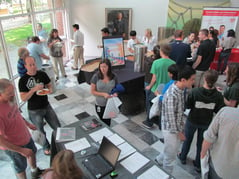About 1 in every 100 babies born have a congenital heart defect (CHD), a structural defect of the heart. In fact, CHDs are the most common types of birth defect. In one quarter of the cases the condition is serious enough to require surgery or other procedures within the first year of life. Despite the frequency, the cause of most congenital heart defects remains a mystery. And without knowing the cause, scientists are not been able to find a way of preventing these defects.

(Image courtesy of Wikimedia commons)
Investigators at the University of Utah are hoping to change that thanks to $3.7 million in research funding from the American Heart Association (AHA). They will begin a project meant to find the cause, prevention methods as well as new treatments for congenital heart defects. The university is one of four groups to join he AHA’s Strategic Focused Research Network (SFRN) for children. A clinician-scientist at U of U Health, Professor Tristani-Firouzi, will serve as the director for the Utah SFRN.
Dr. Tristani-Firouzi will also serve as the primary investigator on the project together with Mark Yandell, a professor of human genetics and Angie Fagerlin, chair of population health sciences at the university. In an article for UNews, Tristani-Firouzi states that, “Understanding the root causes is crucial for designing measures to prevent, predict and even treat CHD. Without knowing what causes the majority of CHD, we cannot design ways to prevent this disease or even effectively counsel families.”
Impacting nearly 40,000 newborns each year in the United States, CHD happen because of incomplete or abnormal development of the fetus' heart during the very early weeks of pregnancy. The defects can involve the walls of the heart, the valves of the heart, and the arteries and veins near the heart. The condition can be very mild, requiring little or no treatment. However, it can be to life threatening. 25% of babies with critical CHDs do not live past the year. Only 69% make it to age 18. Congenital heart defects it can have a profound impact on the overall health of those living with it even if the condition was treated surgically or through other methods. About 20% to 30% of people with a CHD have other physical, developmental, or cognitive disorders.
In the same article for UNews, Dr. Yandell explains, “What makes this project so special is that it brings together experts from multiple disciplines, combining data scientists, genomics experts, clinicians and population health scientists. In our case, the whole really is greater than the sum of its parts.”
By integrating electronic medical records with family history and demographic information from the Utah Population Database (UPDB), researchers will identify those who are most likely to have genetic cause for CHD. Using this pool of individuals, they will search for genetic markers that signal who is at risk for developing the disorder. It is hoped this will help scientists understand the genetic factors that lead to CHDs.
Another, clinician-led research team will study the role of environmental factors that impact the intrauterine environment. Preliminary work shows that when a placenta, which is responsible for nourishing the fetus, does not function properly the fetus may be at risk for developing heart defects. This team will investigate this relationship and work to uncover placental factors that lead to an unhealthy heart.
U of U Life Science Researchers Meet with Laboratory Equipment Suppliers at Biotech Trade Show:
Each year, Biotechnology Calendar, Inc. hosts a product faire event that brings lab suppliers face to face with more than 100 researchers, lab managers, PI's, professors, post docs, grad students, and purchasing agents. The 15th Annual BioResearch Product Faire™ Event at the University of Utah, Salt Lake City, will be held on Wednesday, August 30, 2017.
Suppliers wishing to increase their laboratory product sales by participating in this bioresearch product faire can click the link below or call (530) 272-6675.

Science Professionals attend for free! Click the link for more information and to preregister.



